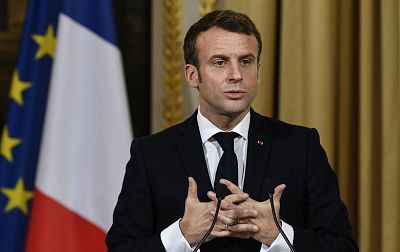Analysis: "Last time they had a summit it was torpedoed by Donald Trump — and now it's not just Trump that they have to worry about," one expert said.
LONDON — Throughout his presidency, President Donald Trump has often alarmed European allies by criticizing NATO, suggesting he might not protect its member states and reportedly threatening to quit the alliance outright.
 ADVERTISEMENT
ADVERTISEMENT
 ADVERTISEMENT
ADVERTISEMENT
But before a NATO summit starts Tuesday in the suburbs of London, it is divisions and disputes among the European allies themselves that are threatening to spoil the party.
The atmosphere has become so sour that NATO effectively downgraded this week's meeting of world leaders by not calling it an official "summit," even though it marks the 70th anniversary of the alliance's founding.
"I think that's very telling," said Keir Giles, a senior consulting fellow at Chatham House, a London think tank. "After all, last time they had a 'summit' it was torpedoed by Donald Trump — and now it's not just Trump that they have to worry about."
That NATO meeting in Brussels in July 2018 was one of the most rancorous in the alliance's history. Trump leveled strident criticism at Washington's friends, and by all accounts dragged the main meeting among world leaders to the brink of meltdown.
Like any European visit by the president, the one this week will prompt no shortage of trepidation about what Trump might do or say, not least because it comes nine days before a pivotal nationwide general election in the U.K.
This time around, though, eyes will be on the French and Turkish presidents, Emmanuel Macron and Recep Tayyip Erdoğan, who are at the heart of a deepening and bitter ideological split within NATO.
NATO 'brain death'
Macron says he wants to refocus energy away from Russia and toward fighting terrorism — aligning with the Kremlin's own aims. In an interview with the Economist magazine last month, Macron said NATO was "on the edge of a precipice" and undergoing "brain death."
His comments were widely taken as an attempt to reset relations with Moscow, alarming some in eastern Europe, particularly those countries on NATO's front line who remember Kremlin rule and still feel its influence today. For many Macron's remarks compounded years of Trump being seen as too soft on Russian President Vladimir Putin.
Among those who disagree with Macron is German Chancellor Angela Merkel, who favors a slower, pragmatic, unified approach to NATO's problems.
Germany has been the chief recipient of Trump's repeated and loud complaints that NATO's European allies do not pay enough toward defense. Other U.S. presidents have raised similar concerns, but few if any have suggested that the U.S. might not protect countries failing to pull their weight.
"While President Trump is unpredictable, I think he's a fairly well-known quantity," said Justin Bronk, a research fellow at the Royal United Services Institute, a British defense and security think tank. "With him, from a European perspective, it's a case of damage control."
Although Trump's remarks sometimes depart from official U.S. foreign policy positions, the White House heralded NATO as "the most successful alliance in history, guaranteeing the security, prosperity and freedom of its members," in a statement last month.
"The more interesting philosophical question in this summit is whether the Macron or Merkel view of NATO leadership comes out ahead," Bronk said.
Macron has also been highly critical of Trump and Erdoğan, who, after the U.S., wields the second largest army in NATO.
The French president told the Economist that European countries need to wake up to the possibility of the U.S. "turning its back on us," and criticized Turkey's "crazy" offensive into northern Syria, which came after American troops pulled back.
Erdoğan fired back at Macron last week, saying, "You should check whether you are brain dead." Both have declined to apologize, raising the possibility this week of more harsh words — and bad publicity for NATO.
'As perverse as it gets'
Many fear that Turkey is drifting away from the West and toward Moscow. Most notably it bought a cutting-edge Russian missile defense system rather than the American alternative.
This prompted the U.S. to kick Turkey Turkey off the F-35 fighter jet program, fearing that if the aircraft was on the same soil as the Russian missile system its movements could be learned and relayed back to Moscow. However, Turkey holds a unique position in NATO in terms of strength and geography, being bordered by Syria, Iraq and Iran.
"The problem with Turkey is that it's too close to Russia and frankly too authoritarian and inconvenient to keep, but also far too strategically important to lose," Bronk said.
All of this ultimately strengthens the hand of Russia, which has shown no contrition for 2016 election interference in the U.S. and elsewhere, backed rebels in eastern Ukraine, and tried to assassinate a spy on British soil, to name just a few of the charges leveled against it.
"It's pretty ridiculous when you have NATO, where it's explicitly understood that the principal problem is the Kremlin, and you have Macron, who in so many ways is the leader of Europe, giving the same lines as the Kremlin," said James Nixey, head of the Russia and Eurasia Program at Chatham House.
"It's as perverse as it gets," he said. "Anything that one can do that makes the Kremlin rub its hands in glee has got to be a bad move."











